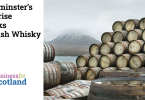A study of the Neart na Gaoithe offshore wind farm (NnG), carried out by the Fraser of Allander Institute at the University of Strathclyde, has estimated that over the lifetime of the project it will generate an economic impact equivalent to 0.6% of Scotland’s Gross Domestic Product (GDP), or £827.4m.
After the completion of the new Queensferry Crossing, NnG will be Scotland’s next major infrastructure project.
The study into the economic effects of this £2bn infrastructure project also reveals that NnG will create 2000 jobs across the four year construction and operational phases.
Some £382m of additional activity will be generated in Scotland’s construction industries, with a further £440.2m in the services sector.
Scottish finance firms have drawn up contingency plans to deal with the potential impact of Brexit.
Scottish Financial Enterprise, which represents firms including Royal Bank of Scotland and Scottish Widows, has told the Scottish Parliament’s Europe committee that firms have been drawing up “contingency plans” outlining how they could set up new EU bases or move operations to other parts of Europe.
SFE has called for “certainty” by the end of 2017 on the post-Brexit transitional arrangements, and said that transitional arrangements should be agreed as soon as possible, to help manage uncertainty for businesses and bolster confidence.
The market for sales of rare Scotch whisky sold at auction has increased by record amounts.
According to Rare Whisky 101’s 2017 half year report shows that both the volume and value of rare Scotch whisky sold at auction has surged; the value of collectable bottles of Single Malt Scotch whisky sold at auction in the UK rose 93.66% to an all-time half-year high of £11.176m, compared with £5.771m in 2016. The number of bottles of Single Malt Scotch whisky sold at auction in the UK increased by 47.25% to 39,061.
The increase in values is reflected in the average per-bottle price, which has risen to a new record of £286.13, up from H1 2016’s £217.56 and FY 2016’s £241.87.
The most expensive bottle of Scotch sold during the period was a 50-year-old Macallan in Lalique, which fetched £65,210 (up from the previous best of £17,000 in 2015).
The salaries of Scotland’s highest paid chief executives have soared and are now worth more than 24 times that of the average worker.
Over the last year the group of chief executives accepted a collective two per cent pay cut, but still amassed more than £35 million in remuneration, with half earning six-figure bonuses.
Research by The Herald has found that median pay for chief executives in their companies’ most recent financial year was £556,000, down from £596,000 the previous year, representing a cut of 5.6 per cent.
The highest paid CEO among the 39-strong cohort was Ross McEwan of Royal Bank of Scotland, who earned £3.5 million last year despite the bank posting a loss of £7 billion.
His salary is the equivalent to that banked by 152 average workers.






